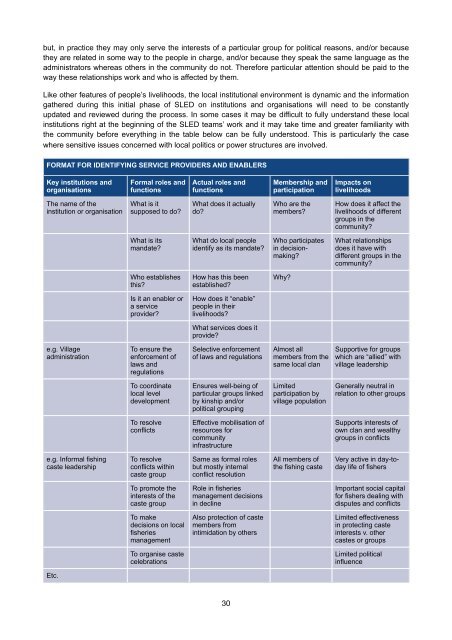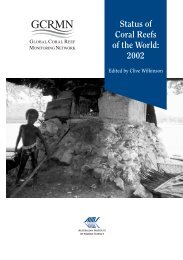Sustainable Livelihoods Enhancement and Diversification (SLED)
Sustainable Livelihoods Enhancement and Diversification (SLED)
Sustainable Livelihoods Enhancement and Diversification (SLED)
Create successful ePaper yourself
Turn your PDF publications into a flip-book with our unique Google optimized e-Paper software.
ut, in practice they may only serve the interests of a particular group for political reasons, <strong>and</strong>/or because<br />
they are related in some way to the people in charge, <strong>and</strong>/or because they speak the same language as the<br />
administrators whereas others in the community do not. Therefore particular attention should be paid to the<br />
way these relationships work <strong>and</strong> who is affected by them.<br />
Like other features of people’s livelihoods, the local institutional environment is dynamic <strong>and</strong> the information<br />
gathered during this initial phase of <strong>SLED</strong> on institutions <strong>and</strong> organisations will need to be constantly<br />
updated <strong>and</strong> reviewed during the process. In some cases it may be difficult to fully underst<strong>and</strong> these local<br />
institutions right at the beginning of the <strong>SLED</strong> teams’ work <strong>and</strong> it may take time <strong>and</strong> greater familiarity with<br />
the community before everything in the table below can be fully understood. This is particularly the case<br />
where sensitive issues concerned with local politics or power structures are involved.<br />
FORMAT FOR IDENTIFYING SERVICE PROVIDERS AND ENABLERS<br />
Key institutions <strong>and</strong><br />
organisations<br />
Formal roles <strong>and</strong><br />
functions<br />
Actual roles <strong>and</strong><br />
functions<br />
Membership <strong>and</strong><br />
participation<br />
Impacts on<br />
livelihoods<br />
The name of the<br />
institution or organisation<br />
What is it<br />
supposed to do?<br />
What does it actually<br />
do?<br />
Who are the<br />
members?<br />
How does it affect the<br />
livelihoods of different<br />
groups in the<br />
community?<br />
What is its<br />
m<strong>and</strong>ate?<br />
What do local people<br />
identify as its m<strong>and</strong>ate?<br />
Who participates<br />
in decisionmaking?<br />
What relationships<br />
does it have with<br />
different groups in the<br />
community?<br />
Who establishes<br />
this?<br />
How has this been<br />
established?<br />
Why?<br />
Is it an enabler or<br />
a service<br />
provider?<br />
How does it “enable”<br />
people in their<br />
livelihoods?<br />
What services does it<br />
provide?<br />
e.g. Village<br />
administration<br />
To ensure the<br />
enforcement of<br />
laws <strong>and</strong><br />
regulations<br />
Selective enforcement<br />
of laws <strong>and</strong> regulations<br />
Almost all<br />
members from the<br />
same local clan<br />
Supportive for groups<br />
which are “allied” with<br />
village leadership<br />
To coordinate<br />
local level<br />
development<br />
Ensures well-being of<br />
particular groups linked<br />
by kinship <strong>and</strong>/or<br />
political grouping<br />
Limited<br />
participation by<br />
village population<br />
Generally neutral in<br />
relation to other groups<br />
To resolve<br />
conflicts<br />
Effective mobilisation of<br />
resources for<br />
community<br />
infrastructure<br />
Supports interests of<br />
own clan <strong>and</strong> wealthy<br />
groups in conflicts<br />
e.g. Informal fishing<br />
caste leadership<br />
To resolve<br />
conflicts within<br />
caste group<br />
Same as formal roles<br />
but mostly internal<br />
conflict resolution<br />
All members of<br />
the fishing caste<br />
Very active in day-today<br />
life of fishers<br />
To promote the<br />
interests of the<br />
caste group<br />
Role in fisheries<br />
management decisions<br />
in decline<br />
Important social capital<br />
for fishers dealing with<br />
disputes <strong>and</strong> conflicts<br />
To make<br />
decisions on local<br />
fisheries<br />
management<br />
Also protection of caste<br />
members from<br />
intimidation by others<br />
Limited effectiveness<br />
in protecting caste<br />
interests v. other<br />
castes or groups<br />
To organise caste<br />
celebrations<br />
Limited political<br />
influence<br />
Etc.<br />
30
















